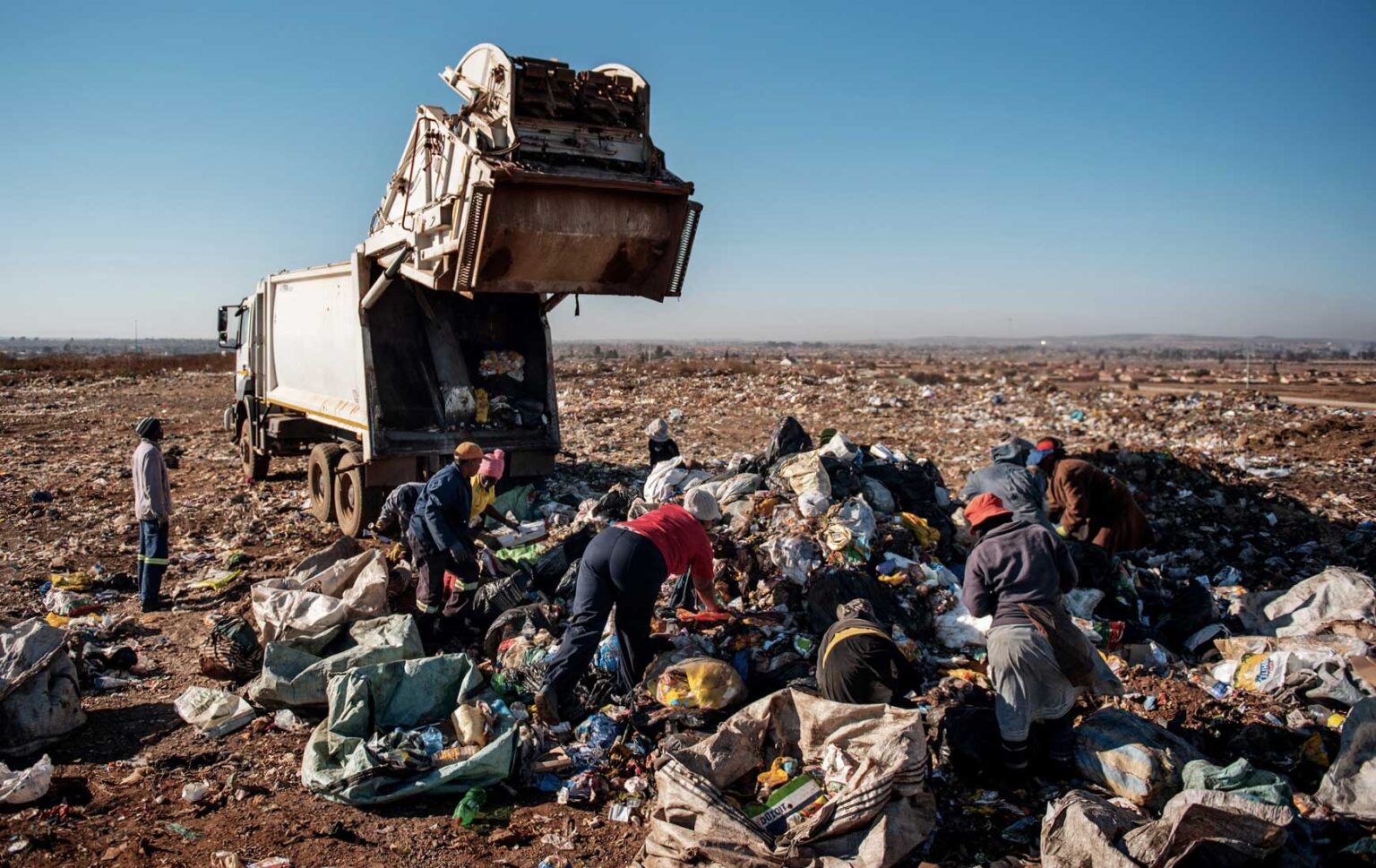Africa’s cities are growing fast. Of the 20 fastest-growing cities in the world, 17 are on the continent, all at more than 5% growth per annum. This vast growth is exceeded by an ever-increasing mass of plastic and other municipal solid waste (MSW), with an average collection rate of just 55%, leaving these cities struggling to cope. This results in some of the dire pictures we see of mega landfills, or poorer housing surrounded by waste.
Across Africa, hundreds of thousands of informal waste pickers sift through tonnes of waste to salvage what has any value. This waste is then sold to recyclers – or, more often, intermediaries.
Increasingly, plastic is the main source of this waste, and it’s a problem that is “getting worse and worse”, according to John Chweya, who has been working as a waste picker in Kisumu, Kenya, for more than 20 years since he was a child. He is now president of the Kenyan National Waste Pickers Welfare Association (KeNaWPWA), an organisation created to represent and fight for better pay and conditions for those doing this work, be it from people’s homes, in the streets, or in landfills.
“In 2001, there was not a lot of plastic in the landfills,” he says. “Then we used to mostly collect metals and cardboard, but over the years, I’ve seen a lot more plastic and non-recyclable plastic.”
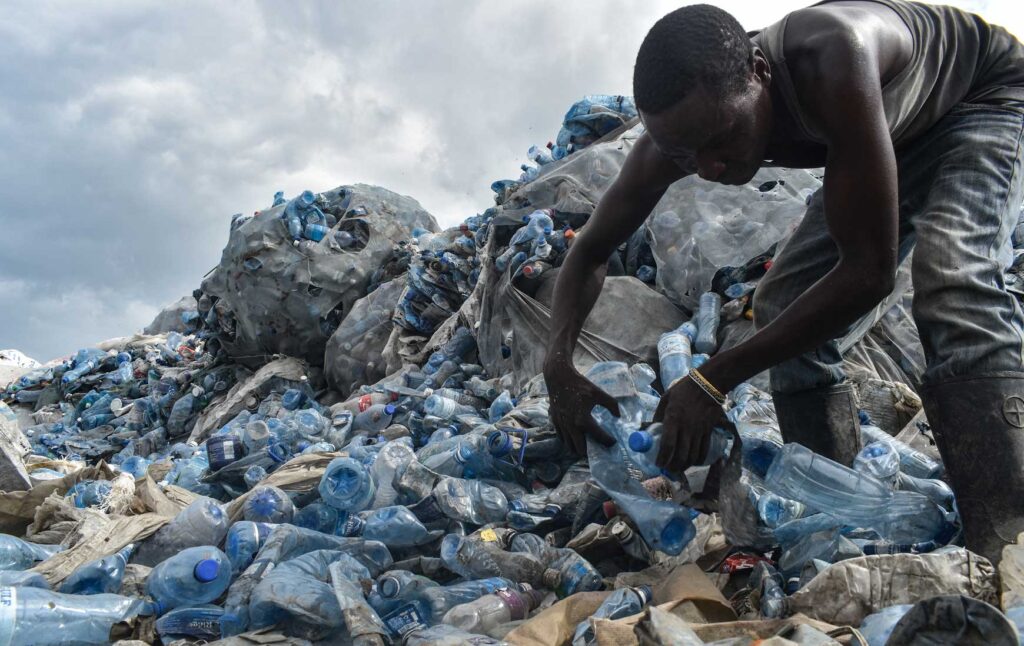
The work of these individuals, often operating where more formal waste management services are either insufficient or non-existent, has had a huge impact on Africa’s recycling rates. In South Africa, the amount of plastic collected for recycling in 2023 amounted to 52% of the total, up from 42.9% the previous year and significantly more than Europe at approximately 31.1%.
KeNaWPWA is not alone. If you spend any time in a major African metropole, you will most likely see reclaimers traversing the city with trolleys to retrieve recyclable materials from waste. Unsurprisingly, this is dirty and dangerous work, with hazards such as fires and burning plastic, as well as threats from working long hours in insecure locations.
“Last year, we lost four waste pickers in a landfill in Nakuru [Kenya] due to fires,” said Chweya. “There’s hundreds and hundreds succumbing to health situations because of this [burning plastic waste at landfills].”
In Johannesburg, South Africa, waste pickers are represented by the Africa Reclaimers Organisation (ARO). According to its website, the organisation was formed in 2018 as the Interim Johannesburg Reclaimers Committee (IJRC) in response to a city council decision to displace informal recyclers by private companies, paying them to do what the reclaimers were doing for free.
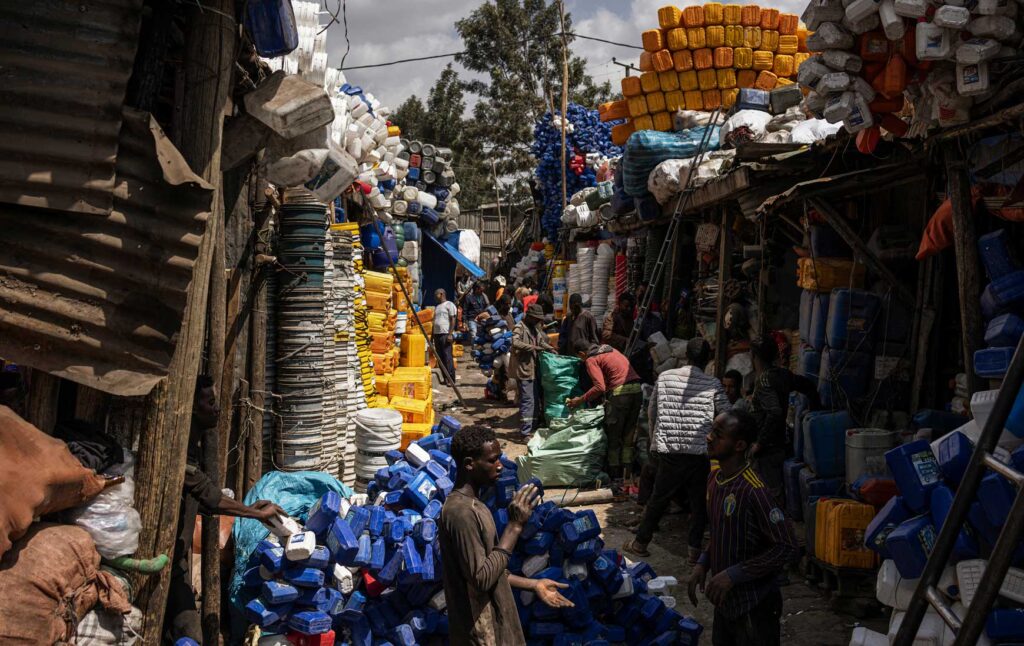
Luyanda Hlatshwayo, an ARO founding member, described the hazards of doing the job. “There’s methane literally burning in front of your eyes,” he said. “You get to see what plastic can do if you don’t manage it properly; it boils. You can see the landfill going down daily, just sinking.
In 2023, ARO partnered with the Alliance to End Plastic Waste (AEPW), an international non-profit organisation that aims to eliminate plastic waste from entering the environment and create circular systems to ensure the reuse of materials.
Through this partnership, ARO acquired a warehouse to use as a sorting centre and several trucks to enable more efficient material collection and sorting.
“We used to work at landfills; now everything gets sorted at the warehouse and our sites,” said Hlatshwayo, who added that a single secure location had made it safer for women who risked muggings and even rape as they pushed their trollies through the streets early morning.
Last year, AEPW earmarked South Africa, along with India and Indonesia, as one of three countries it will explore deeper to push for system change. In addition to financial support, it has also provided technical assistance to connect waste pickers with larger recyclers who pay better than intermediaries but who have set requirements.
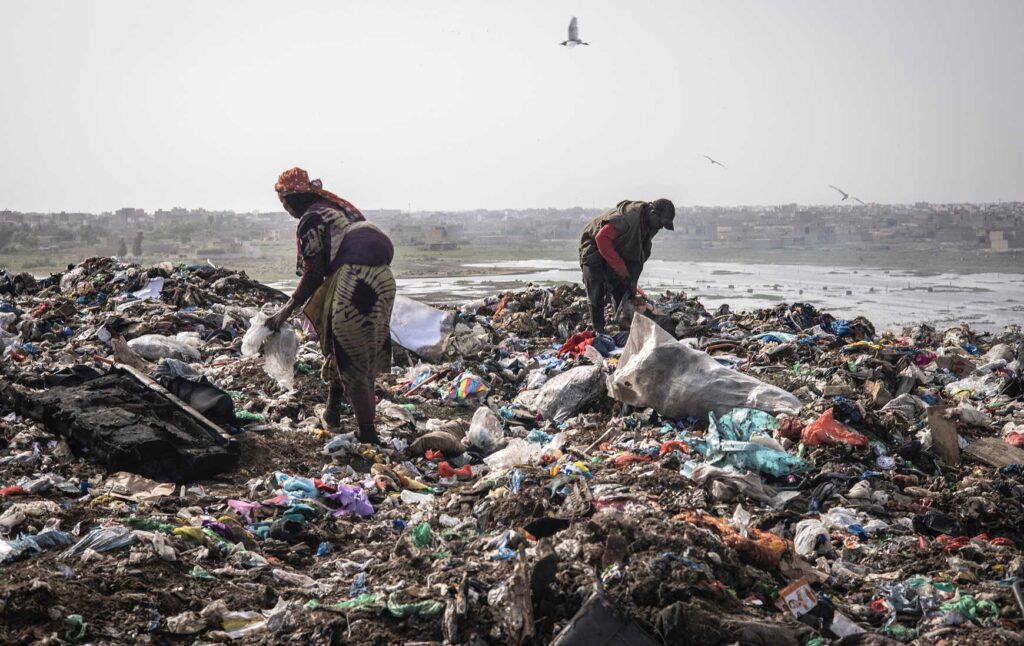
“The challenge is that most waste pickers don’t have the right resources to meet the specifications required by the industry,” Tinashe Machiridza, a senior project manager (Africa) at AEPW, told Africa in Fact. “Certain bail sizes are required, so our projects with ARO included developing a big space for sorting and bailing. We’re looking at scale; when you have enough volume, you can cut out the middleman.”
This has had an immediate impact on livelihoods. Previously, waste pickers would sell what they had to aggregators, who acted as middlemen to the big recyclers and drove prices down to take a cut themselves. “Now we have been able, through the alliance, to connect with big recyclers, who give a much better price,” confirmed Hlatshwayo.
Despite these advances and vital improvements made for the work and lives of reclaimers in terms of impacting urban plastic waste, “there hasn’t been a significant impact on landfills,” he noted. “The infrastructure doesn’t match the amount of waste.”
This is likely to only get worse. Although exact figures are hard to verify, a World Wildlife Fund (WWF) report suggests Africa consumes approximately 17 million metric tonnes of plastic each year, and the fund predicts this figure will increase by 375% by 2060 if business as usual continues.
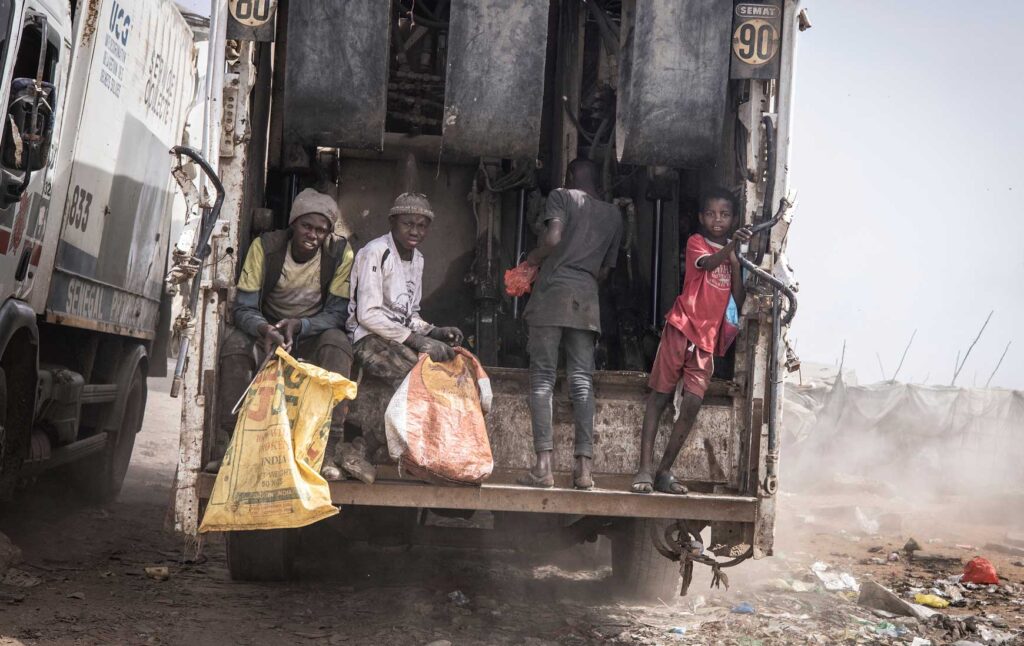
So, it’s easy to see how Hlatshwayo can conclude that “we’re doing a lot, but it’s only a drop in the ocean.”
One programme looking to address this is Extended Producer Responsibilities (EPR), which became mandatory in South Africa in 2021. This policy makes brands, notably Nestle and Coca-Cola, that use plastic packaging responsible for recycling.
“They have control over what kind of packaging is put on the shelf; they are responsible for the collection of said packaging so that it can be sorted and then recycled,” as Allison Lim, vice president of corporate and public affairs at AEPW, explained.
The producer must identify all of its packaging materials included under the regulations, such as paper and plastic packaging, electrical equipment, and batteries. The producers then pay recycling contribution fees to a Producer Responsibility Organisation (PRO) scheme based on the volume weights of the packaging products they sell, which collects and recycles the equivalent waste streams.
These PROs then pay waste pickers and organisations like ARO for the volume of recyclable waste they’ve collected. Waste pickers are paid twice – once for the materials and once for their role in removing the waste packaging.
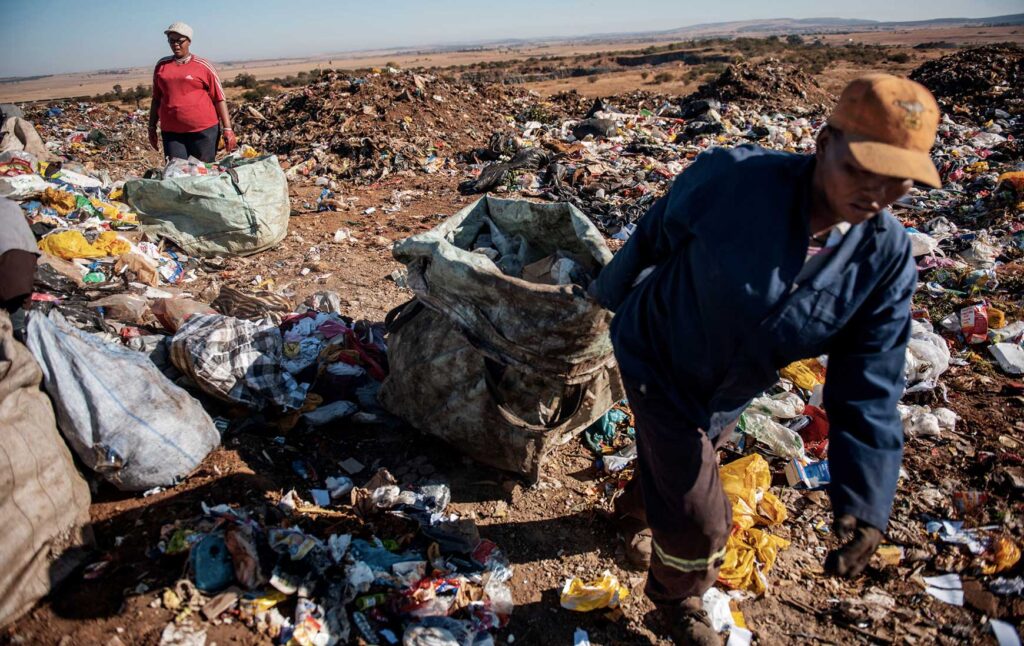
The scheme is not without its faults, though. Many aspects, crucially the amounts producers pay in fees and the amount paid to the reclaimers, are contested.
ARO has protested for a greater service fee from PROs, arguing the packaging waste is produced by some of the world’s richest companies, like Nestle and Coca-Cola Cola, who should be paying more to those who clear it up.
Through the scheme, reclaimers in Johannesburg currently receive 15c (less than 1c in the dollar) a kilo of recyclable material, and Hlatshwayo wants “at least R2 a kilo”. If an average person collects 125 kg, multiplied by R2, it totals R250, which is a good starting base for the day.
He is not alone in demanding that these huge multinational polluters do more to address the mess they’re making and pay the people who are taking care of it.
“I think, generally, these companies are not doing enough,” Chweya argues. “For instance, at Coca-Cola, how much are their employees paid or what benefits do they have, medical allowances, etc., yet the people actually cleaning their mess have nothing?”
It is a difficult and ever-evolving situation. “We’re not going to recycle our way out of the problem; you need to address the whole lifecycle from production to collection and recycling,” concludes Lim. This lifecycle needs to be addressed urgently for the future of Africa’s cities and the lives of those who collect its waste.

Joe Walsh is a freelance journalist based in Johannesburg. He writes about the environment, energy and the green economy as well as politics and society for British publications, including Environmental Finance, the New Statesman and The New European.

